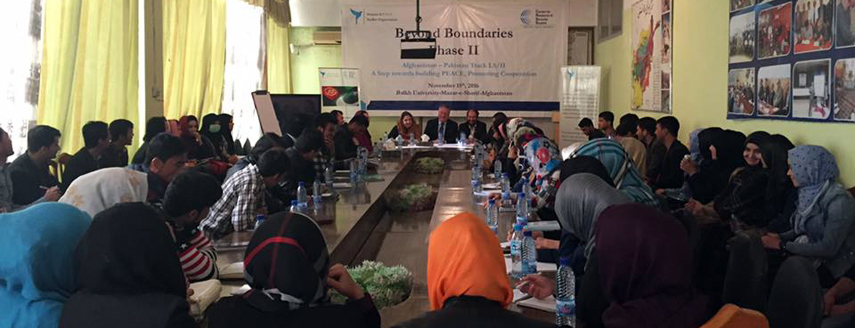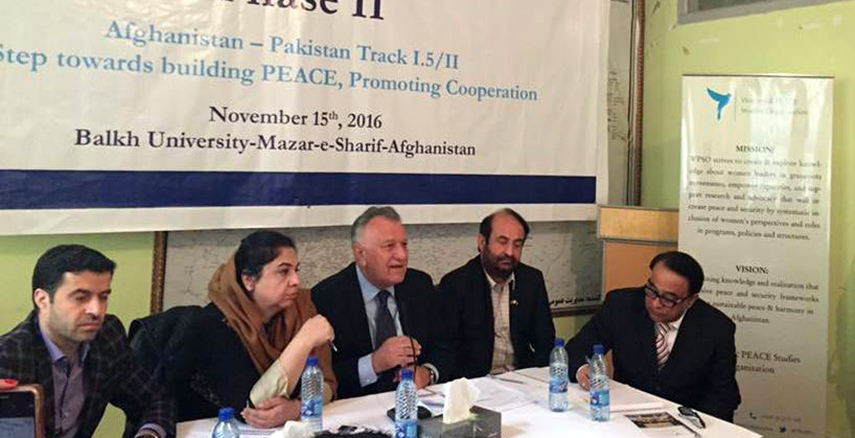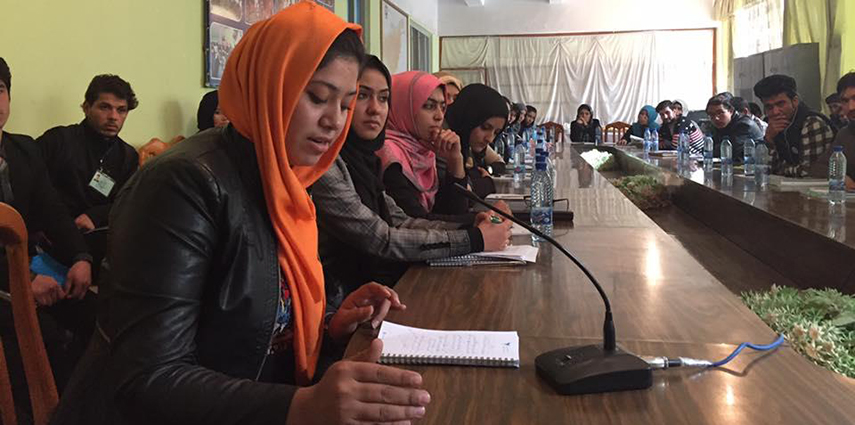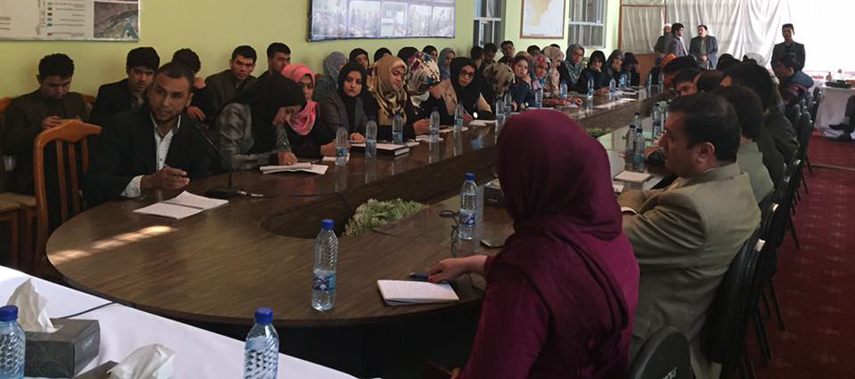As part of the CRSS-WPSO project Beyond Boundaries Phase II, a Pak-Afghan track II series of dialogues and outreach, the second meeting of the Pakistan Afghanistan Joint Committee (PAJC) formed under the project, was held at Mazar-e- Sharif and Kabul from 13 to 17 November, 2016.
During the visit to Mazar-e-Sharif as part of outreach and university interaction planned for the group, two members each from the PAJC visited the Balkh University on Tuesday, November 15, 2016. The Pakistani speakers were former ambassador Qazi Humayun and senior journalist Tahir Khan, while the Afghan speakers included former deputy minister for parliamentary affairs Sayed Qutbuddin Roydar and civil society leader Palwasha Hassan. The organizers CRSS and WPSO were represented by Aized Ali and Asila Wardak. It is pertinent to note that the Balkh University is a Pakistan government funded project and was handed over to the Afghan government in 2011.
The PAJC group was greeted and welcomed by the Vice Chancellor of Balkh University, Professor Adul Haq Haqiq. He thanked the organizers to have arranged this important interaction for the students of university to talk about Pak-Afghan relations and understand better with an open mind and neutral perspective. Other faculty members and about 70-80 male and female students participated in the dialogue which comprised presentations by one member each from both sides, followed by an interactive Question and Answer (Q & A) session. Among the students, majority were female students – about 60 percent.
Speaking from the Afghan side, Palwasha Hassan introduced the guests, briefed the students about the CRSS-WPSO track II project Beyond Boundaries and the two meetings that the PAJC group had held so far. She said the series of dialogue are part of the efforts to create a non-governmental dialogue process to promote people-to-people contact at civil society levels in both the countries. She said “the governments may have problems but we, as people of the two countries, love and respect each other as we have religious, cultural and other common values and we should continue doing so with mutual cooperation as important civil society representatives”.
Other Afghan speaker Sayed Qutbuddin Roydar said that this is a great civil society initiative which has given them the chance to reach out to universities and students to discuss about Afghanistan-Pakistan relations from a non-political point of view to foster and develop mutual linkages and partnerships.
Speaking first from the Pakistani side, Qazi Humayun thanked the Vice Chancellor and faculty members to provide the opportunity to interact with the large number of young male and female students. He said, “I have very happy memories of the people of Afghanistan and our bilateral relations from the time when I served as an ambassador here. It was during the post Jihad period, the sovereignty and independence of Afghanistan were restored, which was very positive for both Afghanistan and Pakistan for their bilateral relations. We are all Muslims with historical and cultural ties. It is, therefore, very unfortunate now to see the Pak-Afghan relations deteriorate. We are, therefore, here for a non-governmental dialogue initiated by CRSS & WPSO to put the dialogue back to more people-to-people and civil society levels. Another factor is that we cannot wish geography away; we are neighbors, we share the largest boundary of 2600 kilometers, and we have to find ways and the means to promote the cultural, historical and religious values that we share.”
Speaking on the occasion, Tahir Khan, the other Pakistani group member said, “I am very happy to be here among you. I feel like I am in my own country. I am with my own male and female students and teachers. Unfortunately, many people in Afghanistan have misperceptions about Pakistan. We, as civil society representatives, are here to counter these misperceptions and answer all your questions and grievances.”
These presentations were followed by an interactive, candid, and passionate dialogue between the students and speakers in the form of Q & A session on Pakistan-Afghanistan bilateral. Other issues included the Afghan refugees repatriation, particularly the recent case of Sharbat Gula, negative perceptions, civil society linkages, further improvement of the campus in Information Technology (IT) and other modern sciences departments, Pak-Afghan trade and linking it to Balkh province, visa and travel difficulties, more opportunities for Afghan students and refugees to study in Pakistan, and problems in Pak-Afghan relations.
Some of the questions and their replies are reproduced as under:
Farzana, a female student from engineering department inquired: “We appreciate what Pakistan has done for the Afghan refugees for almost 40 years but we are surprised at the recent treatment of Sharbat Gula in Pakistan. Can you explain why this is being done?”
In response, Qazi Humayun said: “this is very unfortunate. I must admit that the case of Sharbat Gula was very badly handled by the judge and our government. Whatever happened is not rational and should have been handled better; it should have not happened.” He also pointed out that the PAJC groups have discussed in the recent meetings the issues of refugees and visas. It is the priority of our groups to address these and other problems and we will share our recommendations from these meetings with both the governments, which will also reflect your sentiments and feelings.
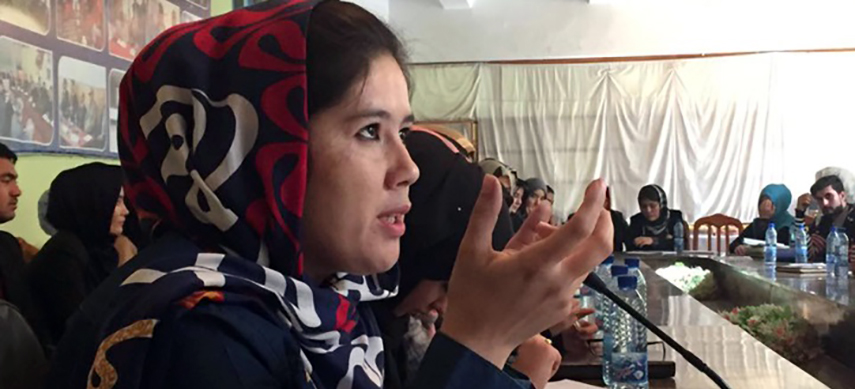 Nagina Akhtar, a female student of political science department welcomed the delegation. She hoped and believed that Afghans will be hospitable to our friends from Pakistan. She said that she firmly believes in improving the people-to-people contact but asked how female students, like herself, can help and improve upon this for the civil society in general?
Nagina Akhtar, a female student of political science department welcomed the delegation. She hoped and believed that Afghans will be hospitable to our friends from Pakistan. She said that she firmly believes in improving the people-to-people contact but asked how female students, like herself, can help and improve upon this for the civil society in general?
Qazi Humayun replied to her stating that unfortunately there are negative perceptions prevailing on both sides due to the accusations and allegations of the two governments against each other. But, we have to delink ourselves as civil society facilitators for the people-to-people change and work towards friendship and cooperation in a mutual way to differentiate between right and wrong. People from both the countries can lobby and emphasize on the governments not to make allegations against respective governments which will in turn create pressure for the governments.
Mohammed Humayoon, a male student form Uzbek language and arts department said, “I, and my fellow students are grateful to Pakistan for the academic help to build this university in Balkh province. But, unfortunately this is not sufficient; we need help to improve IT and other departments here. Also, people from our province have great difficulties in getting Pakistan visas and traveling to Pakistan.” He also remarked that the two governments should work to improve transit through transportation of goods from Pakistan linking it to Balkh province.
Another female student, Azita, from the political science department asked, “have you prepared any opportunity in Pakistan for the education of Afghan refugees as well as any scholarships and opportunities for Afghan students going from here for studying in Pakistan, especially in IT and modern sciences?”
Mr. Humayun informed the students that Pakistan has recently pledged another $500 million to Afghanistan and has also announced further 3000 scholarships for Afghan students to study in Pakistan.
Samir Nek Zamir, a male student from political science and international relations department, asked the delegates about the Beyond Boundaries track II initiative and how it will help the students and the public at large.
Zakir Adeeb, a male student from engineering department said, “the problem lies with the governments on both sides. We, as people, want to improve our communication, language and education in general. We are grateful to Pakistan for help in providing this university. What are Pakistan’s future plans for peace building and the future of Afghanistan?”
Another male student, Zikarullah, from the political science department asked: “we are optimistic about the relations and negotiations between the two brotherly Islamic countries. But, I would like to ask you what is Pakistan government doing in limiting and countering radical madrassas that are involved in terrorism?”
Female student Neela from the English literature department asked about the opportunities available in Pakistan especially for female students going from Balkh University and other universities of Mazar-e-Sharif.
Another female student, Nagina, from the law and political science department said, “the root problem between Pakistan and Afghanistan is political. What is your opinion; why have these talks at the political level failed or deteriorated? Why does Pakistan not enforce the agreements signed with Afghanistan?”
Ajmal Ariana, a male student from the law and political science department said, “there is no problem between the people of the two countries. But, in my view the Pakistani politicians do not consider Afghanistan as an independent country. They issue statements and talk of Afghanistan in reference to Kashmir and interference in Balochistan and other connecting areas. The Afghan politicians talk of terrorist attacks in Afghanistan being planned in Pakistan. Why does Pakistan not work with Afghanistan to tackle and eliminate the Taliban?”
Another male student, Bari Ali Adeeb, from the English literature department asked, “why Pakistani teachers who are here prefer teaching at private universities instead of government universities?”
Qazi Humayun, replying to these set of questions said, “you have talked about the perception that Pakistan is supporting Taliban. Let me ask you; in the last 15 years the US and other 39 countries could not control, fight and eliminate the Taliban or terrorism. After the foreign troops withdrawal it will be a fantasy to expect only Pakistan to deal, negotiate and eliminate Taliban.” He further noted that historically speaking we have made mistakes on both sides; unfortunately this historic baggage is taking these misperceptions to a tangent.
Mr. Humayun informed the students that in his personal capacity as the Secretary of the Youth Hostels in Pakistan, he can extend invitation for 50 to 100 students from Balkh University to visit Pakistan and facilitate them for a 3 day trip. He said he will be happy to coordinate this with the Vice Chancellor present there.
A university survey was also administered with the participating students and faculty members – post the lectures by PAJC members – to gauge the improvement in their perceptions on the other side; understanding of the challenges of Pak-Afghan relations, and awareness about the socio-political conditions in both countries.

